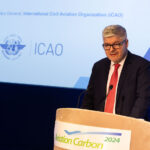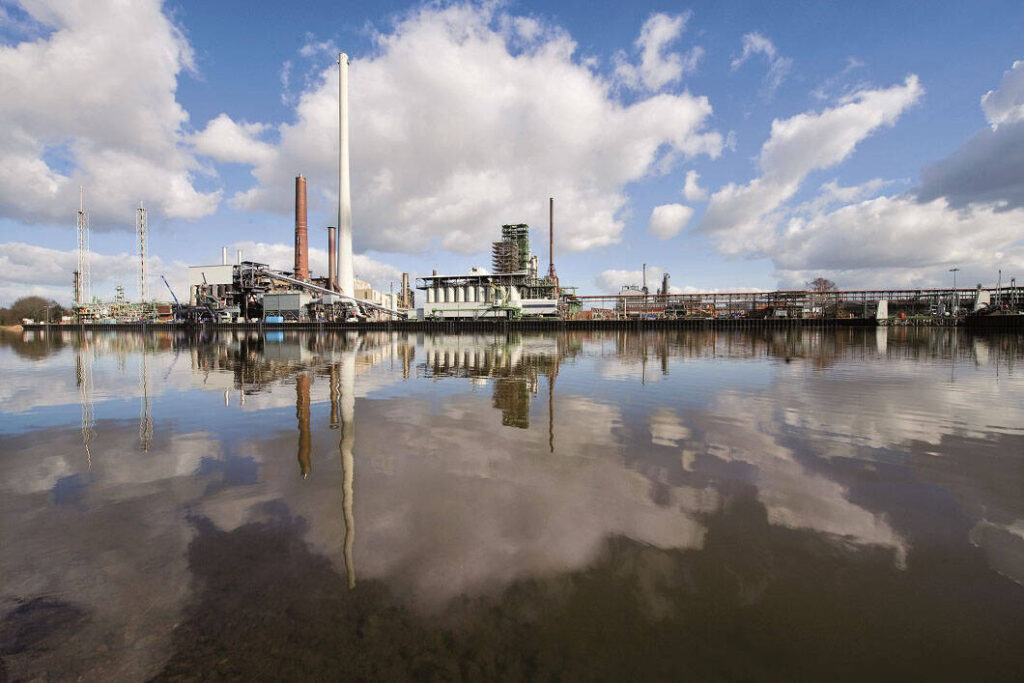The demand for SAF is high but supply remains limited as facilities are still under construction, and production in many cases is years away. But since last year, several oil companies have started producing SAF through co-processing, which is giving SAF supply a boost. In July 2021, NetJets Europe became the first customer to purchase Air bp’s ISCC PLUS certified SAF produced through co-processing of waste fats and used cooking oil in bp’s Castellon refinery in Spain. Other oil companies have followed in rapid succession to announce SAF production through co-processing, including Phillips 66 (UK), TotalEnergies (France), OMV (Austria), Eni (Italy) and bp (Germany). Phillips 66 has just supplied British Airways with a first batch of SAF produced at its Humber Refinery in the UK under a multi-year agreement. Why are the big oil companies choosing this route? Susan van Dyk takes an in-depth look at co-processing, what it means, who is doing it and what volumes of SAF are produced this way.
Andreea Moyes, Air bp’s Global Aviation Sustainability Director, explains her company’s rationale for co-processing: “As an integrated energy company, our ambition is to be a net-zero company by 2050 or sooner and to help the world get to net zero. Part of this is cutting the carbon intensity of the products we sell, such as jet fuel. We believe that all technologies and pathways, including co-processing, are needed to help the industry decarbonise.”
Co-processing is the simultaneous processing of biobased material, such as fats, oils and other feedstocks, with fossil-based feeds in refinery infrastructure. Using an existing refinery can offer benefits in terms of cost savings and carbon reduction as it removes the need to build dedicated processing units. The high market demand for SAF is playing a role in refinery decisions to co-process.
Explained Fabian Wedam, Head of Aviation at OMV Group: “Market demand for sustainable products is increasing sharply in the short to mid term and large scale dedicated SAF production units require a significant lead time for construction.” Co-processing is a stepping stone since existing assets can be used and only limited investments are needed, he said. Co-processing allows OMV to access the growing market for sustainable products in the short term using existing assets and infrastructure in OMV’s refineries. Last December, OMV signed an agreement to supply Austrian Airlines with 1,500 tonnes of SAF produced at its Schwechat Refinery during 2022.
Oil companies have the resources and expertise to produce SAF through co-processing using existing refinery infrastructure and limited investment. “Utilising the existing refinery infrastructure and their links to existing supply networks play an important role in increasing the supply of SAF,” said Moyes. The bp refinery in Lingen has started production of SAF from used cooking oil, marking the first industrial production facility in Germany using co-processing to produce SAF from waste and residues.
Co-processing enables an oil company to quickly become relevant in a net-zero world. According to Bernardo Fallas, Director of Corporate Communications at Phillips 66, “co-processing is one of the ways the Humber Refinery is positioning itself as a refinery of the future.” Phillips 66 believes markets for lower-carbon products are growing, he said. The agreement with British Airways demonstrates its Humber Refinery’s ability to supply them. The airline has just announced it has taken delivery of the first batch of SAF produced by the refinery, which it says is the first commercial-scale SAF to be supplied in the UK (see article). The blended fuel will be supplied by pipeline to several UK airports, including London Heathrow.
“We were the first in the UK to co-process waste oils to produce renewable fuels and now we will be the first to produce SAF at scale,” said Darren Cunningham, Lead Executive UK and General Manager for Phillips 66’s Humber Refinery. “We’re currently refining almost half a million litres of sustainable waste feedstocks a day, and this is just a start.”
Fallas added the Humber Refinery recently increased renewable fuel produced through co-processing from 1,000 bpd to 3,000 bpd, and the refinery aims to expand renewable fuels capacity to 5,000 bpd by 2024.
So what are the current volumes of SAF supplied through co-processing by others in the market? Air bp’s Moyes indicated her company has already produced more than 5,000 barrels per day (bpd) of biofuels (approximately 200-250 million litres total volume of biofuel, although SAF is not the only product) at three refineries through co-processing and aims to triple production by 2030 across these sites. According to Wedam, the planned production of SAF by the OMV Group for 2022 will be 2,000 tonnes, or about 2.3 million litres, of co-processed SAF.
The potential volumes of SAF that a refinery can produce through co-processing is currently limited by ASTM D1655. The standard only permits co-processing of 5% vegetable oils or waste oils and fats, and Fischer-Tropsch synthetic liquids for SAF production. Although 5% may seem a small amount, it could still be considerable if the scale of refinery operations is considered. Bp’s Castellon and Lingen refineries each have a capacity of about 100,000 barrels per day, so 5% amounts to 5,000 bpd (about 200-250 million litres per year).
However, indicated Steve Csonka, Executive Director of the Commercial Aviation Alternative Fuels Initiative (CAAFI) in the US, the 5% “current maximum co-processing volumetric limits are being assessed by a standing ASTM Task Force for possible increase, with broader voting to be accomplished upon the Task Force’s completion in the coming months.”
Moyes confirmed: “Air bp is leading the Task Force seeking to increase the sustainable aviation fuel content of traditional jet available from refineries co-processing renewable feedstocks. The hope is to raise the limit from 5% to 30% to benefit customers and global supply.” Increasing the feedstock limits for co-processing are likely to have a significant impact on the volumes of SAF that could be supplied via this route.
SAF produced through co-processing can be certified as sustainable and is also recognised under CORSIA as an eligible fuel. According to Air bp, the SAF produced through co-processing and supplied to Netjets received ISCC PLUS certification. The SAF had an attributed saving of around 80% carbon emissions over its lifecycle compared with conventional jet fuel based on a mass balance approach. It should be noted that this value is only calculated based on the renewable content in the finished fuel. ISCC has developed a guidance document on the certification of co-processing to assist companies. Various methods or a mixture of methods are permitted to calculate the bio-yield, including radiocarbon 14 analysis, to ensure that only the renewable content is counted.
All the co-processing activities mentioned used fats and oils feedstocks, in most cases waste fats and used cooking oils (UCO). The types of feedstock are currently restricted under ASTM D1655 and limited to fats and oils, and Fischer-Tropsch synthetic liquids. FT syncrude is not currently used in co-processing as it is not commercially available at this time. Other feedstocks may be permitted in future if ASTM certification is achieved, usually a very rigorous process.
“Feedstock availability, as well as reliability of supply and quality, will be one of the key challenges in the future,” said OMV’s Wedam. “Already today, the market for SAF-suitable feedstock is very competitive. Lipid feedstocks will not be sufficient once the aviation industry moves further towards carbon neutrality.”
Feedstock challenges
The challenge with future availability of waste oils and fats feedstock for SAF production has been confirmed in an ICF report, ‘Fueling net zero’. Renewable diesel and biodiesel compete for the same feedstock, and significant expansion of renewable diesel facilities will soon place a constraint on supply.
According to Moyes, bp recognises that “increasing feedstock availability is an important part of increasing overall SAF production and there are two elements to this. Firstly, as most commercial production today uses HEFA feedstocks, increasing these in the short-term is key. In support of this, bp recently entered into a 10-year strategic agreement with Nuseed enabling Nuseed to accelerate the expansion of its Carinata sustainable production programme.
“Secondly, bp plays an ongoing role in researching and developing the technologies required to bring the different SAF production technology options to commercial production. This widens the feedstocks that can be used. For example, bp and Johnson Matthey have developed a simple-to-operate and cost-advantaged Fischer-Tropsch technology that can operate both at large and small scale to economically convert synthesis gas, generated from sources such as municipal solid waste and other renewable biomass, into long-chain hydrocarbons suitable for the production of SAF. Using all technology options, we believe there is enough feedstock availability to meet the industry’s SAF requirements.”
Other feedstocks that have great potential for co-processing are bio-oils/biocrudes produced through technologies such as fast pyrolysis (bio-oils), catalytic pyrolysis or hydrothermal liquefaction (HTL, biocrudes). Unlike fats and oils, these biocrudes can be produced from wastes such as forest or agricultural residues that are available in far greater volumes. However, these technologies are at various stages of technology readiness.
The recently completed Pyrocell plant in Sweden, using BTG Bioliquids’ fast pyrolysis technology, has started producing bio-oil, which will be co-processed by Preem at the Lysekil refinery in Sweden to produce renewable diesel and gasoline. Note that the feedstock limitations under ASTM D1655 for SAF production do not apply to other fuel products. Preem, considered the leader in co-processing activities, has co-processed 30% tall oil methyl esters into drop-in fuels for more than a decade. Following a revamp last year, Preem’s Gothenburg refinery is currently able to co-process 95% tall oil methyl esters and tallow, according to Fredrik Hellesöy, Strategic Business Development Manager at Preem. This highlights the unlimited potential of co-processing to produce significant volumes of low-carbon intensity fuels.
Due to the current feedstock limitations under ASTM D1655, Preem is not producing SAF, but if the 5% limit is increased to 30%, SAF production will become economically feasible, said Hellesöy. For Preem, co-processing is just a step on the way to full conversion, he stated.
Co-processing can increase the supply of sustainably certified SAF in the short-term at current co-processing limits and could become more significant if these limits are increased, and other feedstocks are certified under ASTM. Using existing refinery infrastructure allows for more rapid production of SAF as construction of new facilities proceed. At the same time, it is part of the long-term business strategies of oil companies for a net-zero future.
“This strategy secures long-term business in an ever-changing world and supports the company’s commitment to a sustainable energy future,” said Fallas at Phillips 66.
Added Martin Thomsen, CEO, Air bp: “We believe SAF is one of the aviation industry’s key routes to reducing carbon emissions, and ISCC PLUS certified SAF is the first step towards developing new refining and commercial solutions, including those that achieve CORSIA certification, to keep decarbonising our offers for our aviation customers. Co-processing is an important step in replacing fossil fuel with renewable feedstocks within refineries.”
Photo: The bp refinery in Lingen, Germany (© bpPLC)
















More News & Features
Progress on decarbonising the airline sector has been slow this year, says IATA chief
EASA releases status report on Europe’s SAF production and readiness to meet blending targets
New study highlights differing strategies and barriers to decarbonising aviation in UK and Europe
New partnerships formed to drive e-SAF production in Nordic markets
IAG continues to go big on e-SAF as it inks 10-year offtake agreement with Infinium
US on the pathway to achieving its 2030 SAF Grand Challenge target, says DOE report